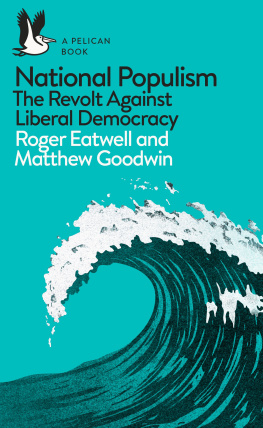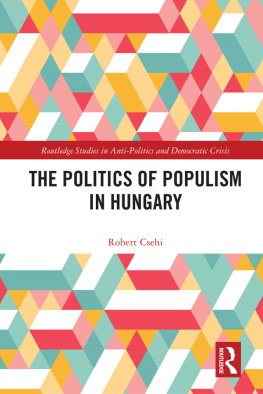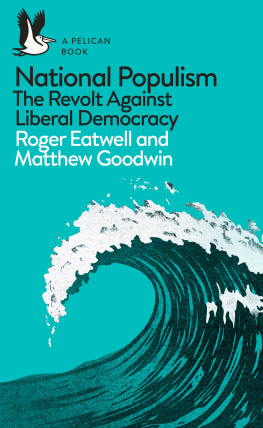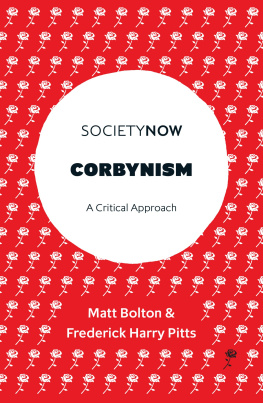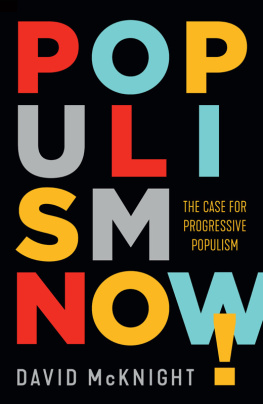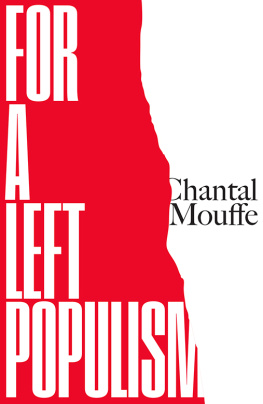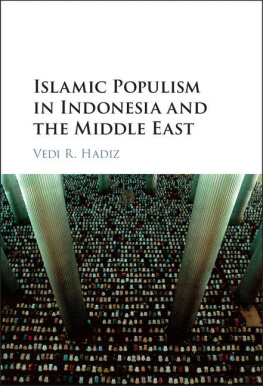Smith J. A. - Other Peoples Politics : Populism to Corbynism
Here you can read online Smith J. A. - Other Peoples Politics : Populism to Corbynism full text of the book (entire story) in english for free. Download pdf and epub, get meaning, cover and reviews about this ebook. publisher: Natl Book Network, genre: Politics. Description of the work, (preface) as well as reviews are available. Best literature library LitArk.com created for fans of good reading and offers a wide selection of genres:
Romance novel
Science fiction
Adventure
Detective
Science
History
Home and family
Prose
Art
Politics
Computer
Non-fiction
Religion
Business
Children
Humor
Choose a favorite category and find really read worthwhile books. Enjoy immersion in the world of imagination, feel the emotions of the characters or learn something new for yourself, make an fascinating discovery.

- Book:Other Peoples Politics : Populism to Corbynism
- Author:
- Publisher:Natl Book Network
- Genre:
- Rating:4 / 5
- Favourites:Add to favourites
- Your mark:
- 80
- 1
- 2
- 3
- 4
- 5
Other Peoples Politics : Populism to Corbynism: summary, description and annotation
We offer to read an annotation, description, summary or preface (depends on what the author of the book "Other Peoples Politics : Populism to Corbynism" wrote himself). If you haven't found the necessary information about the book — write in the comments, we will try to find it.
Other Peoples Politics : Populism to Corbynism — read online for free the complete book (whole text) full work
Below is the text of the book, divided by pages. System saving the place of the last page read, allows you to conveniently read the book "Other Peoples Politics : Populism to Corbynism" online for free, without having to search again every time where you left off. Put a bookmark, and you can go to the page where you finished reading at any time.
Font size:
Interval:
Bookmark:

Contemporary culture has eliminated the concept and public figure of the intellectual. A cretinous anti-intellectualism presides, cheer-led by hacks in the pay of multinational corporations who reassure their bored readers that there is no need to rouse themselves from their stupor. Zer0 Books knows that another kind of discourse intellectual without being academic, popular without being populist is not only possible: it is already flourishing. Zer0 is convinced that in the unthinking, blandly consensual culture in which we live, critical and engaged theoretical reflection is more important than ever before. If you have enjoyed this book, why not tell other readers by posting a review on your preferred book site.
Recent bestsellers from Zero Books are:
In the Dust of This Planet
Horror of Philosophy vol. 1
Eugene Thacker
In the first of a series of three books on the Horror of Philosophy, In the Dust of This Planet oers the genre of horror as a way of thinking about the unthinkable.
Paperback: 978-1-84694-676-9 ebook: 978-1-78099-010-1
Capitalist Realism
Is there no alternative?
Mark Fisher
An analysis of the ways in which capitalism has presented itself as the only realistic political-economic system.
Paperback: 978-1-84694-317-1 ebook: 978-1-78099-734-6
Rebel Rebel
Chris OLeary
David Bowie: every single song. Everything you want to know, everything you didnt know.
Paperback: 978-1-78099-244-0 ebook: 978-1-78099-713-1
Cartographies of the Absolute
Alberto Toscano, Je Kinkle
An aesthetics of the economy for the twenty-first century.
Paperback: 978-1-78099-275-4 ebook: 978-1-78279-973-3
Poor but Sexy
Culture Clashes in Europe East and West
Agata Pyzik
How the East stayed East and the West stayed West.
Paperback: 978-1-78099-394-2 ebook: 978-1-78099-395-9
Malign Velocities
Accelerationism and Capitalism
Benjamin Noys
Long listed for the Bread and Roses Prize 2015, Malign Velocities argues against the need for speed, tracking acceleration as the symptom of the ongoing crises of capitalism.
Paperback: 978-1-78279-300-7 ebook: 978-1-78279-299-4
Meat Market
Female Flesh under Capitalism
Laurie Penny
A feminist dissection of womens bodies as the fleshy fulcrum of capitalist cannibalism, whereby women are both consumers and consumed.
Paperback: 978-1-84694-521-2 ebook: 978-1-84694-782-7
Romeo and Juliet in Palestine
Teaching Under Occupation
Tom Sperlinger
Life in the West Bank, the nature of pedagogy and the role of a university under occupation.
Paperback: 978-1-78279-637-4 ebook: 978-1-78279-636-7
Sweetening the Pill
or How We Got Hooked on Hormonal Birth Control
Holly Grigg-Spall
Has contraception liberated or oppressed women? Sweetening the Pill breaks the silence on the dark side of hormonal contraception.
Paperback: 978-1-78099-607-3 ebook: 978-1-78099-608-0
Why Are We The Good Guys?
Reclaiming your Mind from the Delusions of Propaganda
David Cromwell
A provocative challenge to the standard ideology that Western power is a benevolent force in the world.
Paperback: 978-1-78099-365-2 ebook: 978-1-78099-366-9
Readers of ebooks can buy or view any of these bestsellers by clicking on the live link in the title. Most titles are published in paperback and as an ebook. Paperbacks are available in traditional bookshops. Both print and ebook formats are available online.
Find more titles and sign up to our readers newsletter at http://www.johnhuntpublishing.com/culture-and-politics
Follow us on Facebook
at https://www.facebook.com/ZeroBooks and Twitter at https://twitter.com/Zer0Books
Towards the end of the decade that followed the global financial crash, parties, campaigns, and political formations associated with the radical right achieved shocking victories across Europe and the United States. In textbook populist style, these groups have represented themselves as speaking for a politics that the people the good and sensible silent majority has always wanted and believed in, but has been denied by a vapid liberal elite. Since then, commentators branding themselves as anthropologists of the white working class have fallen over each other to explain the motivations of those who have voted for populism. (There has been much less curiosity, incidentally, about why moderate and liberal voters were so insufficiently inspired by their spokespeople to turn out in adequate numbers to counter the so-called populists)
Two competing explanations for the right-wing victories dominate. The first is that voters who respond to the populist right do so as a result of the economic anxiety of life under globalization. While the liberalization of the world economy since the 1970s has brought net wealth to many western countries, it has also had many deleterious effects: upturning traditional communities and ways of life, depressing wages and imposing inequalities unknown in the twentieth century, as well as expelling whole demographic groups from dependable employment and meaningful political representation (and thats before we get on to its vampire-like treatment of the global south) Yet the value of critiques that attribute support for the radical right to economic insecurity seem to be forestalled when we note that being personally economically insecure is not a reliable predictor of voting for anti-establishment parties.
As such, a growing group of scholars have moved away from economic arguments to focus on values. Eric Kaufmann believes that the Leave/Remain, Trump/Clinton divide is best understood not through the lens of class, but via the difference between those who prefer order and those who seek novelty: a division reflected in any number of recent post-liberal defences of socially conservative somewheres against freewheeling liberal anywheres. Specifically, Kaufmann writes, immigration is unsettling that portion of the white electorate that prefers cultural order over change.
The problem with this values approach is that it confers a dignity of permanence (and a misty-eyed aura of special sincerity) onto such views, that isnt really backed up by reality. There are many possible reasons for this change: satisfaction at reducing immigration figures, a feeling that with Brexit forthcoming immigration is no longer an imposition outside democratic consent, or even the impact of a Labour leadership that has broadly refused to play with the xenophobic fire of its predecessors. But none of these reasons suggest a permanent rooting of anti-immigrant feeling in the immoveable identities of individual voters.
During the long 2016, many among Kaufmanns group of those who prefer order have pursued it precisely by seeking novelty, whether in voting to accommodate a Donald Trump, or even as did 16% of former UK Independence Party voters in 2017 a Jeremy Corbyn. Values seems an oddly ossifying term to apply to a time when electorates seem mainly notable for their ability to change their minds.
Another crucial problem for the values approach is that everything these new populist formations offer and, with the exception of the German AfD, virtually all organizations that made advances under populisms banner around 2016 was available to electorates well before the financial crash.
Font size:
Interval:
Bookmark:
Similar books «Other Peoples Politics : Populism to Corbynism»
Look at similar books to Other Peoples Politics : Populism to Corbynism. We have selected literature similar in name and meaning in the hope of providing readers with more options to find new, interesting, not yet read works.
Discussion, reviews of the book Other Peoples Politics : Populism to Corbynism and just readers' own opinions. Leave your comments, write what you think about the work, its meaning or the main characters. Specify what exactly you liked and what you didn't like, and why you think so.


